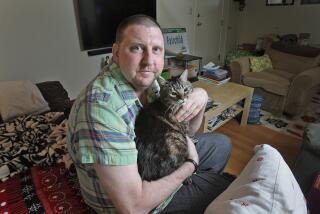Suicide Victim: ‘Life Is Not Life Any More’ : Assisted death: Costa Mesa man, who died with the help of Dr. Jack Kevorkian, wrote to friend of his ‘unbearable’ ordeal with cancer.
- Share via
COSTA MESA — Before he committed suicide with the help of Dr. Jack Kevorkian, Jonathon Grenz wrote a letter to a friend describing the deep despair about the cancer that had made it difficult to carry on a normal life.
“I guess there’s no reason to prolong any of this,” he wrote. “I’m just not going to get any better and time goes by so slowly that it is unbearable. Life is not life any more.”
The contents of the letter were reported in Friday’s Detroit News. The story neither identified Grenz’s friend nor when the letter was written.
The day after his physician-assisted death in Michigan, friends and neighbors in Orange County remembered Grenz as a happy, outgoing real estate salesman who had finally gotten his career on track. But many were saddened by the path he chose to take.
John Cadenhead of Newport Beach said Grenz had attended Corona del Mar High School and graduated in 1965. Grenz’s older sister, Susan, and a younger brother, Phillip, also attended Corona del Mar High.
Grenz’s father, Dr. Alfred H. Grenz of Corona del Mar, who is a retired physician, could not be reached for comment Friday.
When Cadenhead heard that Grenz had died, he was shocked. But like others who knew him, the shock was replaced by mixed emotions, including anger.
“I was really hurt and then upset that he would kill himself because he had cancer,” said Deborah Harris, 41, Grenz’s neighbor and friend.
After Grenz’s condition was diagnosed as throat cancer a year ago, he changed dramatically. He would become fatigued easily. He lost weight. With the disease spreading, doctors removed most of his tongue and implanted an electronic device on his neck to help him speak.
Then, his mother died during the Thanksgiving holiday, and he grew sullen.
Friends who saw him with the voice box said it made him feel embarrassed. “I got the impression that Jon wanted to be left alone after he got his voice box in,” said Bob Coury, 43, Harris’ boyfriend, who had Grenz repair his cars and trucks for him. “Here was a guy who was always working on his truck or Volkswagens. He was always working on something.”
Harris said she was waiting “for time to pass” to go over to Grenz’s house and talk with him about the neck device and what it was doing to him.
“I remember I would ride by on my bicycle and I would see him in front of his house,” Harris said. “I would look toward him, you know how friends see each other and the other person would lift his head and you’re waiting for eye contact? But it wouldn’t come. He would see me, and then drop his head and wouldn’t say hello.”
Harris said his mood lightened once he went into real estate.
“After he got his real estate license, he changed for the better,” she said. “He gained poise, professional poise. He started to dress up. He became so proud of what he was doing, that you could see it in his eyes.”
Both Harris and Coury said they would often wave and Grenz would give a friendly “hello” in return as he stood in the front yard of a small Costa Mesa house he rented. But the last time they saw him was at a garage sale he held a week ago.
Grenz said hello to neighbors and was cordial, but he didn’t mention anything about his contact with Kevorkian or his intentions to eventually end his life, Harris said.
Grenz flew to Michigan and, using Kevorkian’s equipment, inhaled carbon monoxide, becoming the 14th person to die during a physician-assisted suicide. Grenz’s sister, Susan, a physician in Palm Harbor, Fla., was at her brother’s side when he died.
Martha Ruwart, 40, of Cardiff-by-the-Sea, also died on Thursday in the same house where Grenz died. Ruwart had intestinal cancer.
More to Read
Sign up for Essential California
The most important California stories and recommendations in your inbox every morning.
You may occasionally receive promotional content from the Los Angeles Times.













